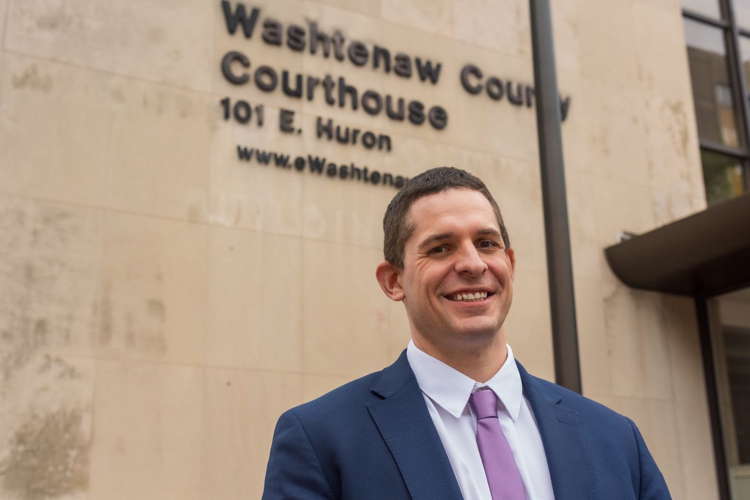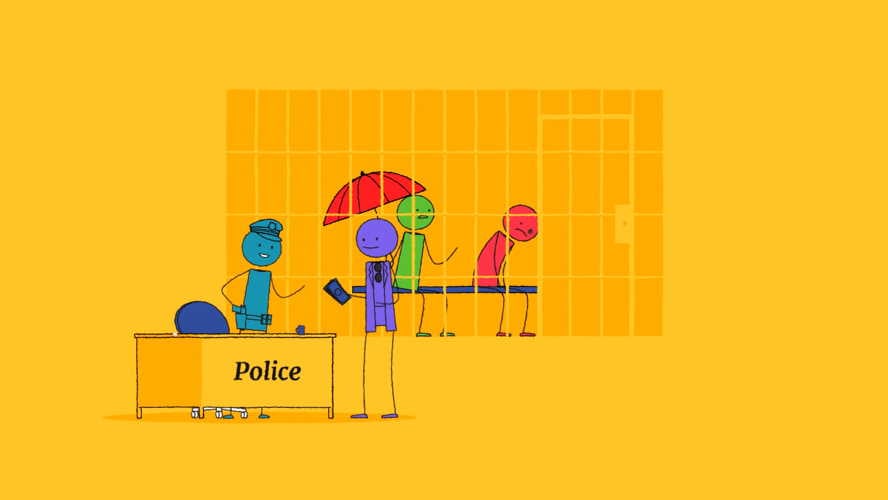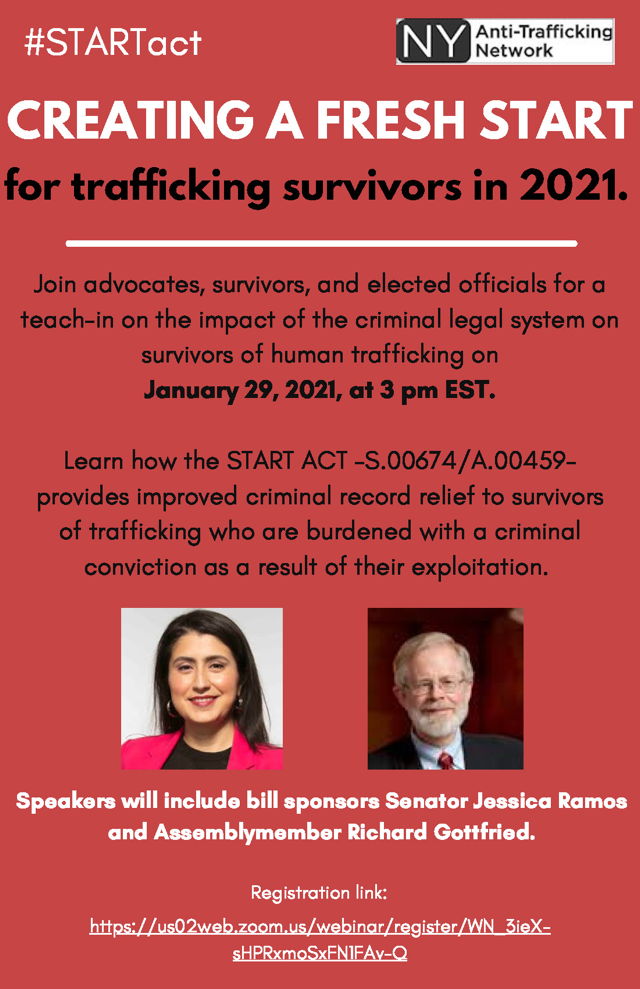Washtenaw County Decriminalizes Consensual Sex Work
January 15, 2021
In a major win for sex workers and other marginalized populations, Washtenaw County’s new prosecutor announced their office will no longer prosecute the buying and selling of consensual adult sex. Advocates, sex workers, and allies are hopeful that other jurisdictions will follow in the footsteps of Washtenaw County, which includes Ann Arbor.
The evidence-based approach stems from the desire to reduce harm for marginalized communities. An article published in the Detroit Free Press reads, “The policy directive that Prosecutor Eli Savit issued Thursday applies to both people who sell sex and those who solicit it.”
Savit's policy cites research showing that criminalization forces sex workers to operate in a black market and in isolated areas, exposing them to violence and exploitation. It acknowledges that the threat of prosecution makes sex workers and survivors of trafficking less likely to report crimes and exposes them to increased risk.
“As with other prohibitionist policies, the criminalization of sex work actually increases the risk of sex work-adjacent harm,” Savit said in an announcement on the prosecutor’s office website. “Forcing sex workers to operate in the shadows increases their susceptibility to physical assault, sexual assault, and trafficking.”
Under the policy, the district attorney will continue to prosecute human trafficking, any solicitation of sex involving minors, any instances of individuals forced into sex work, and other related crimes.
The Detroit Free Press reached out to DSW for comment. Legal director Melissa Broudo responded, “It does feel like the tide is turning, that elected officials are being responsive to facts and data on this issue.” Broudo agreed with others interviewed by the Free Press that Washtenaw County’s new policy would have a significant impact on those who participate in sex work.

Courtesy of Eli Savit.
DSW Newsletter #22 (January 2021)
Hero of the Month: Alex Andrews

Washtenaw County Decriminalizes Consensual Sex Work

January Is Human Trafficking Awareness Month

DSW Staff Share Their Expertise

Mark Your Calendars for January 29

 Hero of the Month: Alex Andrews
Hero of the Month: Alex Andrews
 Washtenaw County Decriminalizes Consensual Sex Work
Washtenaw County Decriminalizes Consensual Sex Work
 January Is Human Trafficking Awareness Month
January Is Human Trafficking Awareness Month
 DSW Staff Share Their Expertise
DSW Staff Share Their Expertise
 Mark Your Calendars for January 29
Mark Your Calendars for January 29
DSW Newsletter Archive
St. Louis mayor candidate calls for ‘decriminalizing’ sex work; opponents disagree | St. Louis Post-Dispatch
The Case for Decriminalizing Sex Work | U.S. News & World Report
January Is Human Trafficking Awareness Month
January 11, 2021
In a 2016 report, Amnesty International called on countries around the world to decriminalize consensual, adult sex work in order to protect the safety, health, and human rights of sex workers, and to combat the egregious abuse and exploitation of human trafficking.1 Numerous other national and international organizations including the World Health Organization, the American Civil Liberties Union, UNAIDS, the Global Alliance Against Trafficking in Women (GAATW), Human Rights Watch, and others have supported that conclusion.2 Human trafficking is a critical issue, not only because of the seriousness of the crime, but also because of its significance in human rights issues more broadly which are “both a cause and a consequence of trafficking in persons.”3
The Freedom Network USA is the nation’s largest coalition working to ensure that trafficked persons have access to justice, safety, and opportunity. Their human rights-based approach to combatting trafficking aligns with DSW’s views on how to end this horrific, exploitative practice.
The Freedom Network USA offers the following guidelines for identifying a person who is being trafficked4:
Human trafficking can happen in any industry, and to persons of any gender, age, and nationality. Stereotypes seen in media are not always representative of real-life situations. However, some common red flags to look out for include:
♦ Person shows signs of abuse, malnourishment, exhaustion, or fearfulness.
♦ Person is not being paid, being paid very little, or is working excessive hours or in dangerous working conditions.
♦ Person is not allowed to leave home or premises or is closely supervised and restricted in movement.
♦ Person does not have access to personal documents such as ID, passport, visa, or social security card.
♦ Person is under 18 and is working in the commercial sex industry.
Again, this list is not comprehensive, and each individual experience is different.
We have a long way to go in the eradication of this grievous crime. The 2020 Trafficking In Persons (TIP) Report made several recommendations for how the U.S. could better address human trafficking. The TIP Report noted that advocates for survivors routinely report a failure of law enforcement to investigate or prioritize labor trafficking. NGOs note insufficient resources dedicated to investigating and prosecuting labor trafficking cases, as opposed to trafficking primarily involving sexual labor, and a lack of familiarity with how forced labor takes place. Indeed, in 2019, 95% of cases opened were investigating trafficking in the sex trade and only five percent were other types of labor trafficking cases.5
Our society’s overemphasis on “sex trafficking” erases and obscures the experiences of so many other survivors of forced labor. This bifurcation can lead to a lack of understanding on how to truly combat the issue, and what trafficking in the sex trade might look like. The Freedom Network USA offers the following definition6:
When a minor (under 18) is given anything in exchange for any sex act OR when an adult (over 18) is trapped or forced into commercial sex by someone else.
Because sex work is generally illegal in the US, sex trafficking victims are often unwilling to seek help and are sometimes refused assistance and protection. Traffickers can be family members, including parents and spouses, friends, and partners. Traffickers often manipulate a person’s isolation, substance use, or dependence, in addition to using violence and threats. Both immigrants and US Citizens are victims of sex trafficking.
It is important to note that victims of trafficking may work alongside individuals who are not being trafficked. They may be working in restaurants, agriculture, factories, or as a 2015 investigation by The New York Times detailed, in nail salons. Traffickers may be parents, spouses, or friends who exploit their victims’ vulnerabilities — immigration status, drug dependence, and social isolation.
One of the most critical ways to support survivors of trafficking is through restitution and relief bills that allow individuals access to resources to help them restart their lives after exploitation. The US has notably decreased protection efforts, granting fewer trafficking specific visas in 2019, and has failed to adapt federal vacatur laws for any survivor of trafficking who has a criminal record as a result of their exploitation.7 In addition to the decriminalization of consensual, adult sex work, these are critical policy efforts that must be made to protect victims.
As noted by so many human rights organizations, the conflation of consensual adult sex work and human trafficking has lead to detrimental outcomes for both sex workers and victims of trafficking. Where sex work is criminalized, trafficking victims are less likely to be identified or to seek help. The decriminalization of sex work has been shown to reduce the rate of trafficking.
Watch DSW’s video on this important issue here:
If you suspect someone is being trafficked, call Call the National Human Trafficking Hotline at
1-888-373-7888.
If you believe someone is in immediate danger,
please call 9-1-1.
________________________
1 https://www.amnestyusa.org/files/briefing_-_sex_workers_rights_-_embargoed_-_final.pdf
2 https://journalofethics.ama-assn.org/article/decreasing-human-trafficking-through-sex-work-decriminalization/2017-01#:~:text=In%20order%20to%20decrease%20human,the%20full%20decriminalization%20of%20prostitution.&text=By%20removing%20punitive%20laws%20that,thereby%20reducing%20marginalization%20and%20vulnerability.
3 United Nations Office of the High Commissioner for Human Rights. Recommended Principles and Guidelines on Human Rights and Human Trafficking. http://www.ohchr.org/Documents/Publications/Traffickingen.pdf. Published 2002:3. Accessed November 18, 2016.
4 https://freedomnetworkusa.org/the-issue/
5 https://www.state.gov/wp-content/uploads/2020/06/2020-TIP-Report-Complete-062420-FINAL.pdf, 516
6 https://freedomnetworkusa.org/the-issue/#trafficking-defined
7https://www.state.gov/wp-content/uploads/2020/06/2020-TIP-Report-Complete-062420-FINAL.pdf, 516

DSW Newsletter #22 (January 2021)
Hero of the Month: Alex Andrews

Washtenaw County Decriminalizes Consensual Sex Work

January Is Human Trafficking Awareness Month

DSW Staff Share Their Expertise

Mark Your Calendars for January 29

 Hero of the Month: Alex Andrews
Hero of the Month: Alex Andrews
 Washtenaw County Decriminalizes Consensual Sex Work
Washtenaw County Decriminalizes Consensual Sex Work
 January Is Human Trafficking Awareness Month
January Is Human Trafficking Awareness Month
 DSW Staff Share Their Expertise
DSW Staff Share Their Expertise
 Mark Your Calendars for January 29
Mark Your Calendars for January 29
DSW Newsletter Archive
DSW Staff Share Their Expertise
January 9, 2021
PornHub invited DSW’s legal director, Melissa Broudo, to share her expertise on legal issues related to sex work in their two-day “Sex Worker Survival Guide.”
The event brought together a diverse group of presenters for a “how-to,” appropriate for individuals with any amount of experience in sex work. PornHub promised, “presentations, panels and conversation … a place where those with industry knowledge and real experience teach basic harm reduction strategies in the areas of health (mental and physical), safety (in person and online), financial security and business savvy.”
Recordings of the presentation and discussions can be found on PornHub’s sexual wellness site: https://www.pornhub.com/sex/, though they haven’t been posted as of the date of the publishing of the newsletter.
December 2, 2020: DSW’s J. Leigh Brantly participated in an internal Inclusion and Diversity Panel for upper management at Clinique. They spoke about the intersectionality of gender, sexual orientation, and the reality of sex work history for many trans people, due to discrimination and exclusion in corporate workplaces.

Courtesy of PornHub.
DSW Newsletter #22 (January 2021)
Hero of the Month: Alex Andrews

Washtenaw County Decriminalizes Consensual Sex Work

January Is Human Trafficking Awareness Month

DSW Staff Share Their Expertise

Mark Your Calendars for January 29

 Hero of the Month: Alex Andrews
Hero of the Month: Alex Andrews
 Washtenaw County Decriminalizes Consensual Sex Work
Washtenaw County Decriminalizes Consensual Sex Work
 January Is Human Trafficking Awareness Month
January Is Human Trafficking Awareness Month
 DSW Staff Share Their Expertise
DSW Staff Share Their Expertise
 Mark Your Calendars for January 29
Mark Your Calendars for January 29
DSW Newsletter Archive
Hero of the Month: Alex Andrews
January 7, 2021
Alex Andrews is on a mission and she’s happy to have you get in her way. She’ll ask you to join her (and you likely will) within three minutes of meeting. Practical, passionate, and purposeful, Andrews is determined to change the way contact with the legal system plunges individuals into a vicious cycle that can be and feel impossible to break. She would like to see each state fully decriminalize consensual adult sex work. While Andrews fights for this ultimate goal, she’s making allies and ensuring sex workers impacted by the legal system have the resources they need to thrive.
“Find your place,” says Andrews. She points out that the National Rifle Association (NRA) comprises only five percent of gun owners in this country. She can imagine how much more powerful sex workers would be nationwide if just five percent committed themselves to fighting for the decriminalization of their own lives and the lives of others. “We all have value. We have to agree to disagree on some of the smaller issues so that we can come together on a national level. We all want full decriminalization but in the meantime, we need to reduce the harm caused by systemic failures,” she implores. Andrews is proud to be part of a diverse community with such “a vast range of skills, talents and lived experiences.” After pulling herself out of a miserable spiral of jail, probation, court fines, and instability, she wants to support others as they do the same.
The “scar of incarceration,” is deep and painful. Andrews knows firsthand. She recalls the sound of metal doors clanging behind her, the click of handcuffs around her wrists, and the incredible uncertainty and fear that comes with arrest. “What happens next? How long do I sit here? I’m going to lose my apartment. I’m completely alone.” Andrews grew up with a supportive family but knew she couldn’t turn to them during these darkest moments. She found herself in a turbulent cycle that led to twelve arrests. She believes that because she lived in fear of another arrest and acted from this place, she continued to make bad decisions that made this fear a reality. It was hard to find stable housing, to pay her court costs, and to get out from under the thumb of predatory bonds people.
With a license in cosmetology, Andrews kept a “vanilla” job as often as she could but it wasn’t enough to pay the bills. She broke her kneecap after slipping down a flight of stairs while working in a strip club and began to escort — it was impossible to dance, cocktail, or work in a salon while she healed. She knows she is lucky to not have had any negative experiences while engaging in sex work — it was her choice and she enjoyed it but the negative consequences of criminalization continued to weigh her down.
At the age of 38, Andrews was finally free from the vortex of probation, court costs, and arrests. She recalls sitting on her patio with her husband and for the first time in so many years, feeling at peace. It took about thirty seconds for her to feel compelled to ensure others could experience that same feeling.
Naturally, she had a passion for working with individuals who were incarcerated, isolated, and stuck in the vicious cycle of the legal system. She connected with people incarcerated in Central Florida who had experienced unspeakable violence at the hands of the legal system. The letters Andrews received and conversations she had were transformational. She was overwhelmed by the extent to which people had been cut off from society and disenfranchised due to their arrests and she knew she needed to work to change the system. Andrews joined the SWOP Orlando Chapter in 2015. She had been doing this work for a while on her own and credits SWOP with giving her the language and tools to expand her advocacy.
Today, Andrews just completed her 4th year on the National Board of SWOP-USA and as a co-founder and co-executive director of SWOP Behind Bars, an organization that supports individuals who have been incarcerated. She works to “reduce the shame, discrimination, and stigma of sex work by...using [herself] as an example to demonstrate that sex workers are just like everyone else.” Andrews was reticent to be named a “DSW Hero,” citing Monica Jones, Annie Sprinkle, Margo St. James, and many others as the “true heroes,” in whose footsteps she follows. She’s about to embark on her annual trip to The Super Bowl to bail out sex workers who are wrongly arrested under the criminal legal community’s guise of fighting human trafficking.
Andrews and her team will be on the ground again, this time in Tampa, bailing individuals out. Not only will they pay sex workers’ bail, but they’ll also cover court fines and other costs — part of Andrews’ never-ending quest to prevent people from getting stuck in that vicious cycle that causes lasting trauma and instability. She and her team will prioritize trans people and people of color as they’re less likely to have other supports. They’ll also be doing outreach — know your rights presentations, safety planning for arrest and critical to Andrews, preparing individuals for what to expect should they be arrested. She wants to do what she can to prevent others from experiencing the deep uncertainty and shame she did upon arrest. Help her and her team with their on the ground efforts here: https://swopbehindbars.giv.sh/c92f
Big picture, Andrews thinks we have a “unique opportunity with the incoming administration for national work on decriminalizing consensual adult sex work.” She wants sex workers and others to come together and to work together to fight predatory laws such as SISEA (Stop Internet Sexual Exploitation Act), which would curtail free speech and infringe on sex workers’ ability to support themselves. She has ambitious goals — housing first, social supports that address the issues of instability that keep people from living comfortable, fulfilling lives. She knows they’re lofty but she’s not easily discouraged. She’s sure that if everyone fighting for the same ultimate goal — decriminalization — works together, they can achieve it. “There are so many personalities, so many skill sets … they’re all valuable and all critical to serving our community.”

Courtesy of Alex Andrews.
DSW Newsletter #22 (January 2021)
Hero of the Month: Alex Andrews

Washtenaw County Decriminalizes Consensual Sex Work

January Is Human Trafficking Awareness Month

DSW Staff Share Their Expertise

Mark Your Calendars for January 29

 Hero of the Month: Alex Andrews
Hero of the Month: Alex Andrews
 Washtenaw County Decriminalizes Consensual Sex Work
Washtenaw County Decriminalizes Consensual Sex Work
 January Is Human Trafficking Awareness Month
January Is Human Trafficking Awareness Month
 DSW Staff Share Their Expertise
DSW Staff Share Their Expertise
 Mark Your Calendars for January 29
Mark Your Calendars for January 29
DSW Newsletter Archive
Senators Merkley and Sasse Introduce Bill That Infringes on Privacy Rights
NEWS RELEASE | FOR IMMEDIATE RELEASE
Media Contact:
Ariela Moscowitz, director of communications
[email protected] | (212)368-7874
Senators Merkley and Sasse Introduce Bill That Infringes on Privacy Rights
NEW YORK (Dec. 24, 2020) — U.S. Senators Jeff Merkley (D-OR) and Ben Sasse (R-NE) introduced the Stop Internet Sexual Exploitation Act (SISEA) last week. They claim that the bill’s purpose is to protect children, who cannot consent, and adults who have not consented to the sharing of pornographic images of them online. However, forty-six states and Washington, D.C. have anti-revenge porn laws in place and federal law prohibits the production, distribution, importation, reception, or possession of any image of child pornography. This bill is unnecessary and infringes on the rights and income of adults who engage in sex work consensually.
SISEA is like other misguided initiatives such as the EARN IT ACT and SESTA/FOSTA. Proponents of these laws argue that they combat human trafficking, although the laws, as written, fail to punish traffickers. Instead, they undercut the most crucial statute protecting freedom of speech on the internet (Communications Decency Act 230) and endanger the safety, health, and human rights of consensual sex workers and trafficking victims. Far from being a tool to combat sexual exploitation, SESTA/FOSTA ultimately forced websites to close, endangering sex workers and leading to their increased exploitation and financial desperation.
A recent barrage of anti-sex policies, including Instagram’s changes to its terms of service, threatens free speech and harms sex workers. Decriminalize Sex Work’s legal director Melissa Broudo explained, “There is a clear, consistent, and targeted attack on sex workers online under the guise of protecting women and ensuring safety; ironically, all of these measures will ultimately harm those who are the most marginalized. They all fail to target actual trafficking, but instead seek to censor and obstruct people’s ability to work independently and safely.”
Merkley and Sasse claim that this bill is about privacy, but it requires individuals to volunteer sensitive information. The bill calls for people who do not want their pornographic content posted online to enter identifying information into a database. Though the bill mentions that identifying information would be protected, it requires platforms that host pornographic content to cross check their information against the database, with no practical guidance on how to do this without breaching confidentiality. The consequences for an individual whose name is made public and associated with this database could be disastrous. Similarly, individuals who upload videos must trust that online platforms will protect their information.
The bill would create an impossible burden for most platforms. Smaller platforms, especially, will either shut down or ban all pornographic content completely, leaving sex workers who rely on these sites without income. SISEA was introduced as Congress announced Americans would receive $600.00, if they receive anything at all, which many argue does nothing to ease the financial devastation caused by COVID-19. This bill adds injury to insult for the most marginalized workers.
###
Decriminalize Sex Work is a national organization pursuing a state-by-state strategy to end the prohibition of consensual adult prostitution in the United States. We work with local organizations, advocates, and lobbyists to build community support and convince legislators to stop prostitution-related arrests. Evidence shows that decriminalizing sex work will help end human trafficking, improve public health, and promote community safety.

